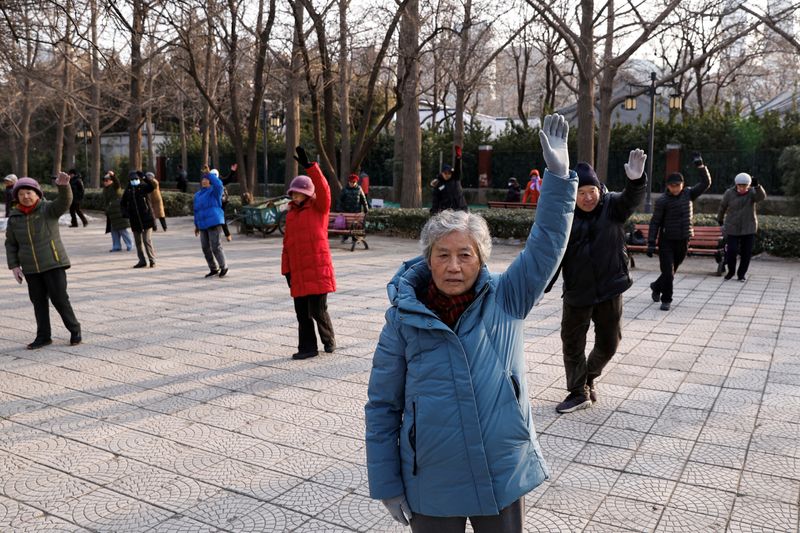By Farah Master
HONG KONG (Reuters) -China's top legislative body this week assessed an official plan to delay the country's retirement age, among the world's lowest, taking a key step towards changing decades-old labour laws and easing economic pressures stemming from a shrinking workforce.
The ruling Communist Party said in July that China would gradually raise the country's retirement age. The retirement age is now 60 for men, about six years below that in most developed economies, while for women in white-collar work it is 55, and 50 for women who work in factories.
Having people work for longer would abate some pressure on pension budgets with many Chinese provinces already reeling from large deficits. It would also delay pension payouts and require older workers to stay at their jobs longer, which may not be welcomed by all of them.
The topic was a top trending item on Chinese social media after the official Xinhua news agency reported that top National People Congress members discussed the topic in Beijing on Tuesday, with many expressing concerns about more job seekers chasing insufficient openings.
"It is an inevitable choice for China to adapt to the new normal of population development," Mo Rong, Director of the Chinese Academy of Labour and Social Sciences told the People's Daily.
Reform is urgent with life expectancy in China rising to 78 years as of 2021 from about 44 years in 1960, and projected to exceed 80 years by 2050. At the same time, the working population needed to support the elderly is shrinking.
National health authorities expect the cohort of those aged 60 and older to rise from 280 million to more than 400 million by 2035, equal to the entire current populations of Britain and the United States combined.
Each Chinese retiree is now supported by the contributions of five workers, half of what it was a decade ago and trending towards 4-to-1 in 2030 and 2-to-1 in 2050.
Eleven of China's 31 provincial-level jurisdictions are running pension budget deficits, finance ministry data show. The state-run Chinese Academy of Sciences sees the pension system running out of money by 2035.
JOB CONCERNS
Draft changes to the law to adjust the retirement age are expected to be published to get public feedback in the coming weeks.
More than 100,000 individuals commented on social media platform Weibo (NASDAQ:WB) under Xinhua's post, concerned about worsening unemployment for young people and the elderly working longer because of delayed pension payments.
"Young people cannot find jobs, middle aged people are worried about being laid off and now there is another problem: the elderly can't retire," said a Weibo user.
It is unlikely that raising the retirement age would result in both young and elderly people clamouring for the same jobs, said Stuart Gietel-Basten, professor of Social Science and Public Policy at Hong Kong's University of Science and Technology.
"It's a different set of jobs that older people are going to be keeping on, blue collar and white collar jobs which will be different to entry level ones," he said.
In Japan and South Korea, people can only receive pensions at 65 and 63 years, respectively, due in part to longer life expectancies.

However, raising the pension age may be more complicated in China due to the differences amongst provinces and between rural and urban areas.
"When you look purely at life expectancy it should be raised but it's got to be done in a fair way, particularly if you are a migrant or gig worker who has moved around and may not get those years paid in," Gietel-Basten said.